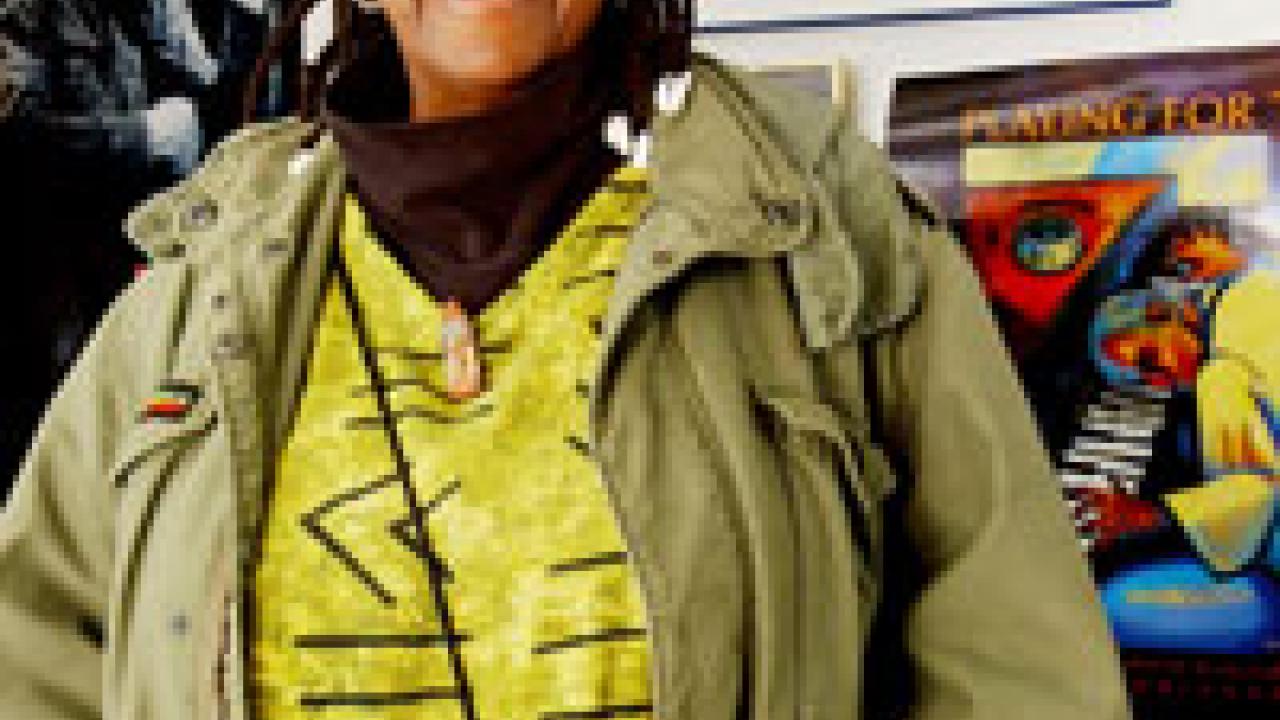Staajabu's name means "full of wonder" in Swahili. That wonder comes across in Staajabu's mighty pen, the one she wields about her life as a single mother and African American woman. Her poetry sings and rings with pride and dignity, and she tells what it is like to live in a society that she believes has too much modern-day discrimination in it.
"Black is the sound," Staajabu once wrote, "of victory and survival."
She may be the only one-word-named employee on campus. She also holds another distinction, having worked at UC Davis the past 15 years as a temporary employee, though no one is sure what the record is. Her current job is currently as a full-time program representative in the landscape architecture program in the Department of Environmental Design.
Being a mother and grandmother, however, may be her most meaningful calling in life.
"The most important thing you'll do in life is help raise another human being," she said. "No matter how hard you work anywhere, it pales in comparison to the role of a parent. The love and guidance you give your children will return to the world and you in many ways."
Her daughter, V.S. Chochezi, and two grandchildren, Jessicah and Tisho Pratt, are also poets. Together they are known as the Straight Out Scribes with several poetry books and a spoken-word CD to their credit. They recently published a poetry anthology, Scribes Rising.
Originally from Camden, N.J., Staajabu, who was born with the name of Victoria Dorn, earned a journalism certificate in the Air Force and worked in Philadelphia in the early '80s. She is an admirer of the death-row prisoner Mumia Abu Jamal and advocates, in both her poetry and activities, for better treatment of people who are incarcerated.
Staajabu was given her Swahili name back in 1968, when she helped raise money for civil rights groups that were jailed because of picketing.
Staajabu has worked in many different departments on campus and at the Medical Center -- entomology, veterinary medicine, engineering, internal medicine, pediatrics and radiology, to name but a few. The nature of temporary employment -- spending only a few weeks or months in any one particular setting -- is ideal for her.
"Once I learn something, master something, I like to move on to a new challenge. Getting a full-time permanent job never appealed to me. I like change."
What do you like most about your job?
I love working with the students. That's what I'm really good at.
And the least?
When budget cuts start happening, it affects people; they get nervous and insecure, lose their enthusiasm. It's hard on everyone.
What's something surprising about you?
I haven't owned a car for 20 years. I don't own a TV and really dislike commercials. People ask me how I can get so much reading and writing done. It's because I don't watch TV. I also hate airplanes and don't fly if I don't have to.
I take the bus every day to work. I've been taking the same bus for years. There is a core group of us who know each other very well.
How did you like working as an Air Force journalist?
It was different. This was back in the 1980s. Dover Air Force Base in Dover, Del., has the largest mortuary on the Eastern Seaboard. I was there when the bodies of the U.S. Marines killed in Beirut came back. I was actually in the Air Force twice -- once when I graduated from high school. Later in the 1980s I needed a job so I re-enlisted.
As an Air Force journalist, you can't exactly tell the truth or make the Air Force look bad in any way. But it was good training in many ways, and I even learned about radio and photography. In the end, it helped me to write better.
Read any good books lately?
I read as much as I can. Recently finished Amy Tan's The Bonesetter's Daughter and Phillip K. Dick's Do Androids Dream of Electric Sheep? I grew up reading all the time -- books were central to my life. My brother used to give me comic books and science fiction -- from age 4 on, I was reading all the time. My favorite writer is Toni Morrison.
What's one of your treasured possessions?
My enhanced Army coat that I've attached shells to. Also, my computer is extremely important to me as a writer.
How did the civil rights era influence you?
It made me want to learn more and to ask questions about my history. It also made me careful in how I raised my daughter -- I closely monitored her education to make sure she was learning, for example, the history and culture she needed to. Above all, I wanted her to be, and believe she is, comfortable as an African American woman.
p>What's your guilty pleasure?Ice cream and sleeping late.
If you had three wishes, what would they be?
World peace. A cleaner planet. And an end to poverty. •
